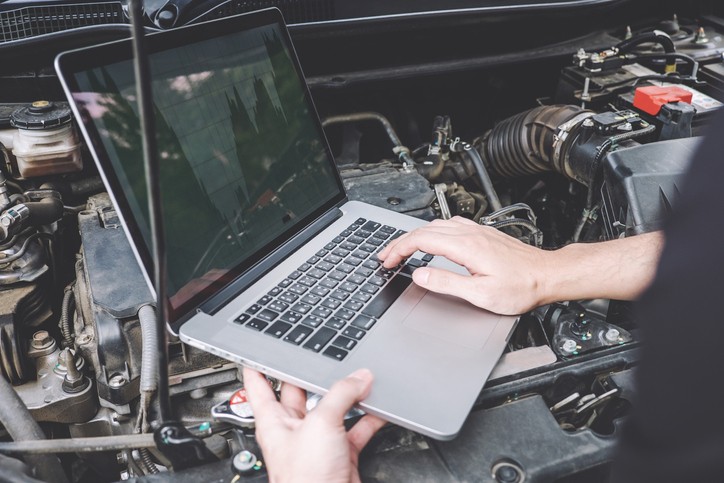Modern vehicles rely heavily on sophisticated computer systems to manage everything from engine performance to fuel efficiency. Reprogramming your car’s computer, also known as flashing or remapping, can be a powerful way to optimize your vehicle’s operation and address certain issues. This process, applicable to most cars manufactured from 1996 onwards, essentially updates the software within your car’s Engine Control Module (ECM) or Powertrain Control Module (PCM), ensuring these vital components are running at their peak.
 Car computer reprogramming process: A mechanic connects a scanner to the OBD-II port to update the vehicle's software.
Car computer reprogramming process: A mechanic connects a scanner to the OBD-II port to update the vehicle's software.
Why Consider Reprogramming Your Car’s Computer?
There are several compelling reasons why you might want to reprogram your car’s computer. One primary benefit is enhanced vehicle performance. Just like your home computer or smartphone benefits from software updates, your car’s computer can also gain from refreshed programming. Over time, factory settings in your car’s computer may become less optimal due to wear and tear or evolving driving conditions. Reprogramming can recalibrate systems like fuel injectors and powertrain management to ensure smoother, more efficient operation. This can translate to improved fuel economy and a more responsive driving experience.
For car enthusiasts seeking to maximize their engine’s potential, reprogramming offers a route to increased power output. By adjusting parameters within the ECM, mechanics can fine-tune engine performance to deliver more horsepower and torque. This is akin to performance tuning in the digital realm, allowing you to unlock hidden capabilities within your existing engine.
Furthermore, reprogramming can be a solution for certain drivability issues and even those pesky “check engine” lights. Sometimes, a check engine light illuminates due to a software glitch or outdated programming within the PCM. For instance, if the PCM, which manages components like the EGR valve, isn’t responding correctly due to a software issue, reprogramming can rectify this. In such cases, updating the computer’s software can resolve the problem and turn off the check engine light, saving you from unnecessary diagnostic and repair costs.
While some mechanics might suggest reprogramming every few years as a preventative measure, it’s generally not considered part of routine maintenance unless you are experiencing specific problems, or if the manufacturer has issued a recall requiring a computer update. If your car is running smoothly without any issues, reprogramming isn’t typically necessary.
The Process of Reprogramming Your Car’s Computer
Reprogramming your car’s computer is a relatively straightforward process that relies on specialized equipment. It involves connecting a professional-grade scanner tool to your vehicle’s diagnostic port, often referred to as the OBD-II (On-Board Diagnostics II) port. This port is typically located beneath the steering wheel inside the cabin, but its exact location can vary depending on your car’s make and model.
Once the scanner is connected and linked to the internet to access the latest software updates from the manufacturer, the process begins. The first step is to erase the existing programming from your car’s computer. After the old software is removed, the new, updated software is installed, effectively replacing the old programming with the most current version available. Think of it as updating the operating system on your personal computer or smartphone – the core software is refreshed to improve functionality and address potential issues.
The duration of the reprogramming process can vary. Factors such as the complexity of your vehicle’s computer system and the size of the software update can influence the time required. Generally, reprogramming can take anywhere from approximately 15 minutes to an hour to complete. In situations where the software installation encounters an error or fails to install correctly on the first attempt, the process may need to be restarted to ensure successful completion.
Cost and Considerations
The cost associated with reprogramming your car’s computer is not fixed and can fluctuate based on several factors. The type of vehicle you drive is a primary determinant, as different makes and models may have varying software complexities and update procedures. The labor time involved also plays a role, as longer reprogramming processes will naturally incur higher costs. While it’s difficult to provide a precise price range without knowing your specific vehicle, it’s advisable to inquire about pricing from a qualified mechanic or service center specializing in car computer reprogramming.
In conclusion, reprogramming your car’s computer can be a valuable tool for enhancing performance, resolving software-related issues, and ensuring your vehicle operates at its optimal level. It’s a modern approach to car maintenance and performance tuning that leverages the power of software updates to keep your vehicle running smoothly and efficiently. If you are considering reprogramming or want to learn more about its benefits for your specific car, consulting with a trusted mechanic is a wise first step.